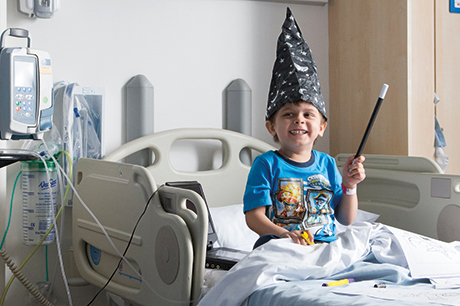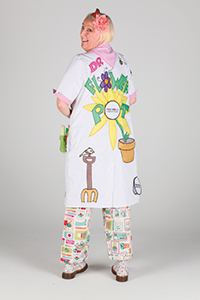
Download the PDF of this article
Transforming their hospital bed into a spaceship and zooming from the ward may be a dream for many ill or injured children, but through this fantasy play Giggle Doctors can help to relieve pain and stress while bringing fun and laughter to hospitalised children.
Each year in the UK, around one million children aged under 15 years old have their lives turned upside down by being admitted to hospital. Some children with illnesses such as cancer or leukaemia can be there for weeks or months. Others visit hospital as outpatients for treatments such as dialysis or day surgery. Whatever the reason, it can be an upsetting and bewildering time for all the family, including siblings.
For the hospitalised child, not only do they have to deal with the discomfort or upset of their diagnosis and treatment but they also need to adapt to an unfamiliar, clinical environment with its different sounds, smells, food and routines. It can lead to children regressing in their behaviour and development and becoming upset, anxious or withdrawn. In addition, a hospital stay means they are removed from their families, friends, nursery or school, resulting in them missing out on play and social interaction.
Helping children to overcome the anxiety and upset of a hospital stay is Theodora Children’s Charity, whose 25 Giggle Doctors visit 33,000 children in 21 hospitals, three hospices and two specialist care centres throughout England.
‘Being in hospital can be boring, scary and painful for children and they can also take on the anxiety that their parents may be feeling,’ explains Emily Swords, chief executive of Theodora Children’s Charity. ‘Giggle Doctors are there to alleviate the upset of a hospital visit. They make it less traumatic and more of a positive experience by helping the children to play and just be a child.
‘Giggle Doctors encourage communication, imagination and play, which is hugely important to young children. It means that children continue to be stimulated during their time in hospital and are more ready to return to the nursery or school environment. We’ll visit any child who’d like to be visited, from babies to teenagers. Children may be in hospital for a broken ankle to receiving radiotherapy, have cystic fibrosis or dialysis – we can handle it all.’
LAUGHTER AND A CHANGE OF SCENE
Giggle Doctors, despite their name, are not just about laughter. Sometimes they may tell a story, perform a magic trick, sing, blow bubbles or simply tie a balloon to the foot of a bed. ‘Giggle Doctors can adapt their style enormously to the child and their improvisation skills are phenomenal. They never know what is going to happen on a visit and what a child may need,’ explains Ms Swords. ‘We talk a lot about laughing, but they provide so much more – from companionship to a change of scene without leaving the hospital and getting the child to think about other things. These are all just as important as big belly laughs.’
Many of the Giggle Doctors have performing arts backgrounds, are play specialists or children’s entertainers, but despite not being medical professionals, Ms Swords believes they are viewed as an important part of the hospital team because they provide a different element of care which is performance-based. They consciously don’t conduct distractions during medical interventions but visit children to provide a fun and positive experience that’s not associated with painful procedures.
Giggle Doctor training is a mix of artistic and medical workshops covering topics such as child development, infection control, child bereavement and the impact of illness and bereavement on families. They are also trained in ‘Intensive Interaction’, a practical approach to working with people with severe learning difficulties, helping them to relate and communicate better with the people around them.
‘They are able to create play from nothing and put children at the centre and let them lead,’ says Ms Swords. ‘We pride ourselves on our Giggle Doctors working with a calm and sensitive style. They don’t leave the ward with lots of hyperactive, giddy children and the nursing staff trying to calm them down. Part of the skill is that their play has a beginning, middle and an end.’
FEELING OF WELL-BEING
Feedback shows that Giggle Doctors improve children’s experience of hospital and feeling of well-being (see box), with one parent telling the charity that her daughter actually looks forward to attending hospital for chemotherapy thanks to a Giggle Doctor. They can also help to keep parents and siblings upbeat and give them something new to talk about.
‘Many hospitals have weekly visits from the Giggle Doctors. Longer-term children know which day is Giggle Doctor day, and parents have said that they deliberately book appointments for them, which is very special,’ adds Ms Swords.
Laughter has been found to encourage the release of endorphins, which are a natural pain and stress fighter. ‘Anecdotally, doctors and nurses tell us that they thought they may have to do a medical intervention because the child was so anxious or stressed, but a Giggle Doctor visit prevented it by helping the child to relax,’ says Ms Swords. ‘There’s less to worry about being in hospital if you’re able to turn your bed into a spaceship.’
case study: Dr Flowerpot
 ‘I love that we can go into a space where there is a lot of stress and sadness and still get giggles,’ says Helen Jones, aka Dr Flowerpot, a former nursery nurse, who has worked as a Giggle Doctor in the Midlands and North of England for seven years. ‘It’s lovely to hear children call out for Dr Flowerpot and I never know each day who I’ll meet and what I’ll do. There’s no set routine. I may make balloons, do some magic, play my watermelon-shaped ukulele or simply have a quiet moment.
‘I love that we can go into a space where there is a lot of stress and sadness and still get giggles,’ says Helen Jones, aka Dr Flowerpot, a former nursery nurse, who has worked as a Giggle Doctor in the Midlands and North of England for seven years. ‘It’s lovely to hear children call out for Dr Flowerpot and I never know each day who I’ll meet and what I’ll do. There’s no set routine. I may make balloons, do some magic, play my watermelon-shaped ukulele or simply have a quiet moment.
‘You can allow amazing things to happen if you let the child lead. It’s not us performing for them but them taking the chance to escape from their illness or pain, which is a joy to be able to help them to do. Getting the first smile from a child who’s been extremely poorly can make parents sob.
‘Being a children’s holiday rep brought out my silly and playful side and I enjoy performing as Dr Flowerpot, a motherly character never without her pet slug which says “meow” and can lead to many absurd conversations.
‘I recently visited a poorly child whose mother hadn’t left her side for a few months. Her little brother was visiting and I was able to lift the mood by bringing out my slug for a ride on a car around the room and make him giggle. It’s sad but amazing to have these moments. I’m not there to make them better, but for enjoyment and fun and to alleviate the pressure.
‘Children who have spent a long time in hospital can become very suspicious of adults because they have little control. Giggle Doctors are a friend, fantasy characters who don’t prod or touch or ask how they are but provide a release and allow the child five minutes not to have the focus on their complaint. Everything can become polarised on their illness and we can give them back a little of their childhood with a song or a few jokes.’
GIGGLE DOCTORS: FEEDBACK
From hospital staff
100 per cent of hospitals believe that the Giggle Doctors improve children’s experience of hospital.
88 per cent of hospitals believe the Giggle Doctors increase the opportunities for fun inside hospital.
From parents and guardians
100 per cent of parents/guardians believe the Giggle Doctors had a positive impact on their child.
82 per centof parents/guardians said that the Giggle Doctors improved their child’s experience of hospital.
76 per cent of parents/guardians believe the Giggle Doctors helped to reduce their child’s distress and anxiety while in hospital.
MORE INFORMATION
Theodora Children’s Charity, which runs the Giggle Doctors, will be our charity partner at this year’s Nursery World Awards, www.nurseryworldawards.com









